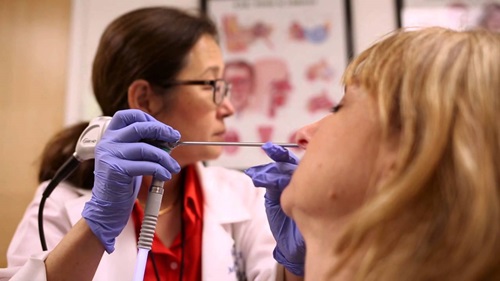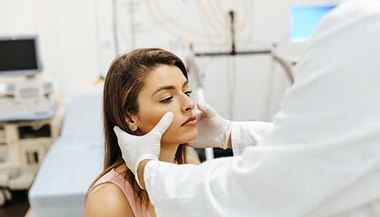Endoscopic Sinus Surgery
Endoscopic sinus surgery, sometimes called functional endoscopic sinus surgery (FESS) is a minimally invasive procedure to treat problems in the sinuses.
What You Need to Know
- Endoscopic sinus surgery is an outpatient procedure performed while the patient is asleep under general anesthesia.
- Endoscopic surgery may be used to remove nasal polyps and tumors, treat chronic sinus infections, and address other types of sinus problems.
- The doctor uses a device called an endoscope, along with other tools, to access and treat the problem area through the nostrils.
- Minor bleeding, pain, congestion, discharge and fatigue are common after the surgery, but should go away in one to three weeks.
What is endoscopic sinus surgery?
Endoscopic sinus surgery is a procedure to remove blockages and treat other problems in the sinuses using an endoscope — a thin, rigid tube with a camera and a light. This type of surgery does not include cutting the skin because it is performed entirely through the nostrils.
Who may need endoscopic sinus surgery?
Endoscopic sinus surgery can help people who experience nasal congestion, pain, drainage, difficulty breathing, loss of sense of smell (anosmia) or other symptoms due to:
- Sinusitis (persistent or chronic sinus infections)
- Nasal polyps
- Nasal obstruction or blockage
- Sinus and nasal tumors
The goals of endoscopic sinus surgery include:
- Reduce the number and severity of sinus infections
- Improve sinusitis symptoms
- Improve the drainage of the sinuses
- Improve airflow through the nose
- Improve the sense of smell
- Allow access for nasal rinses to reach the sinus cavities for cleaning and medication delivery
Preparing for Endoscopic Sinus Surgery
Because general anesthesia will be used, you will be instructed to not eat or drink after midnight before the procedure. Your surgical team will inform you of any other preparations, which may include:
- Prescription medications to be taken before and after surgery to help reduce inflammation.
- A preoperative physical exam is performed by your primary care physician to provide medical clearance for the surgery. Your surgeon and primary care doctor may also order lab tests and studies.
- Smoking cessation is often required, and should start three to four weeks before surgery and continue for a month after surgery. Smoking causes increased scar tissue and poor healing, which leads to failure of endoscopic sinus surgery.
- Stopping certain medications and supplements could help reduce your risk of bleeding during and after sinus surgery, as well as prevent interference with anesthesia. The following should be stopped at least two weeks before surgery:
- Aspirin and NSAIDs such as ibuprofen and naproxen
- Fish oil, vitamin E and herbal medicines such as gingko biloba, ginseng and garlic tablets
- St. John’s wort (may interact with anesthesia)
- Anti-coagulation medicines such as warfarin and clopidogrel (blood-thinning medications)
- Purchasing over-the-counter medications: Having the following over-the-counter medications handy before your surgery may help during recovery:
- Nasal saline mist can be used every three to four hours after surgery to keep your nose moist and humidified.
- Decongestant nasal spray with oxymetazoline should be used after surgery if you have steady bleeding that doesn’t stop with a gentle head tilt.
Sinus Center

The Johns Hopkins Sinus Center provides state-of-the-art evaluation and treatment for a variety of nose and sinus conditions, including environmental allergies, nasal obstruction, nasal tumor and related disorders.
What happens during endoscopic sinus surgery?
Endoscopic sinus surgery is usually performed as an outpatient procedure with the patient under general anesthesia (asleep). During the surgery:
- The sinus surgeon inserts an endoscope — a thin camera rod with a light at the end — into one nostril and uses it to magnify and visualize the sinus tissues.
- After locating the problem, the surgeon uses specialized instruments alongside the endoscope to open the sinuses by carefully removing causes of sinus blockage, such as mucous membrane swelling, nasal polyps and scar tissue.
- If a deviated septum causes breathing problems, specialized instruments can straighten the septum and reduce the size of the turbinates (bony structures inside the sinuses).
- Most patients do not require nasal packing that needs to be removed.
After surgery, you will spend a few hours in a recovery room to allow you to wake up. Most patients feel well enough to go home a few hours after the surgery.
Postoperative Care
Your doctor will provide you with instructions for relieving discomfort and keeping your sinuses clear after FESS, which could include the following:
- Nasal saline spray: Nasal saline mist spray can be used every two to three hours after surgery, and can make your nose more comfortable. Saline sprays are over-the-counter medications, and can be purchased in any pharmacy.
- Sinus irrigation: You will start sinus irrigation with the sinus rinse kits the day after surgery. Irrigate at least twice daily for best results, following the instructions provided by your doctor or nurse. If you haven’t done it before, irrigation may feel strange. Soon, however, it will become soothing as it helps clean out the debris left behind in your sinuses after surgery.
Endoscopic Sinus Surgery Recovery
You may experience the following symptoms after endoscopic sinus surgery:
- Bleeding: It is normal to have some bloody discharge for the first three to five days after sinus surgery, especially after you irrigate your sinuses. If you experience steady bleeding, tilt your head back slightly and breathe through your nose gently. You may dab your nose with tissue, but avoid blowing your nose. If this does not stop the bleeding, you may use oxymetazoline nasal spray. Several sprays will usually stop any bleeding. If the spray fails to stop steady nasal bleeding, call your doctor.
- Pain: You should expect some nasal and sinus pressure and pain for the first several days after surgery. This may feel like a sinus infection or a dull ache in your sinuses. Extra-strength acetaminophen should relieve mild discomfort. Avoid aspirin and NSAIDs such as ibuprofen or naproxen. If acetaminophen is not sufficient to control the pain, use the postoperative pain medication prescribed by your doctor.
- Fatigue: You can expect to feel tired for the first week after surgery. This is normal, and most patients plan on taking at least one week off work to recover. Every patient is different, and some return to work sooner.
- Nasal congestion and discharge: You will have nasal congestion and discharge for the first few weeks after surgery. Your nasal passage and breathing should return to normal two to three weeks after surgery.
You will need to return to your doctor several times after the surgery for follow-ups to aid the healing process. During these visits, the care team will clean your nose and sinuses of fluid and blood left behind after surgery. There is some discomfort involved with the cleaning, so it is best to take a pain medication 45 minutes before your visit.
What to Avoid After Endoscopic Sinus Surgery
- Nose-blowing, heavy lifting and straining: You should avoid straining, heavy lifting (anything heavier than 20 pounds) and nose-blowing for at least 10 days after surgery, as these activities may cause bleeding. You can resume 50% of your regular exercise regimen one week after surgery and your normal routine two weeks after surgery.
- Aspirin or non-steroidal anti-inflammatory (NSAIDs) medications: Stop taking aspirin and NSAIDs such as ibuprofen and naproxen two weeks before surgery, and avoid using them for two weeks after surgery.
- Steroid nasal sprays: If you were taking nasal steroid sprays before surgery, you should avoid using these for at least two weeks after sinus surgery to allow the lining of the nose and sinuses to heal. Your doctor will tell you when it is safe to restart this medicine.
Endoscopic Sinus Surgery: Risks and Complications
As with any surgery, there are risks involved with having endoscopic sinus surgery. Complications are rare and may include:
- Bleeding: Minor blood loss is expected during surgery, and it is usually tolerated well by patients. In rare cases, excessive bleeding may occur, requiring the surgeon to stop the surgery. Vary rarely, bleeding after surgery becomes excessive and requires a visit to your surgeon to get nasal packing to stop the bleeding.
- Infection: To reduce this risk, you may be given a dose of antibiotics during surgery and a prescription for antibiotics after surgery. Occasionally, a person may develop a sinus infection after surgery that requires a stronger antibiotic.
- Cerebrospinal fluid (CSF) leak: During endoscopic sinus surgery, the surgeon is working beneath the bone that separates the brain from the nose. It is extremely rare for this bone to be injured during surgery, which would result in a CSF leak. Such an injury is generally identified and repaired right away. If a leak is diagnosed after surgery, a second procedure is required to patch the opening.
- Changes in vision: The sinuses are very close to the eyes, which makes an eye injury possible during sinus surgery, resulting in temporary or permanent double vision or other vision changes. Injury to the tear ducts may cause excessive tearing after surgery. Fortunately, these are exceedingly rare complications. Swelling may also occur around the eyes after surgery. Temporary blurry vision can happen in some patients, but goes away on its own.
- Other risks include changes in your nasal breathing or sense of smell. If a septum is altered during the sinus surgery, there is a small risk of developing a septal tear or numbness in your teeth. Some patients have persistent sinus disease after surgery that requires treatment with antibiotics, steroids or another surgery.
When to Call the Doctor After FESS Surgery
- Fever higher than 101 degrees Fahrenheit in the days following surgery
- Constant clear watery discharge from the nose a week after surgery
- Sudden vision changes or eye swelling
- Severe headache or neck stiffness
- Severe diarrhea
- Steady, brisk, nose bleeding that doesn’t get better after using decongestant spray






